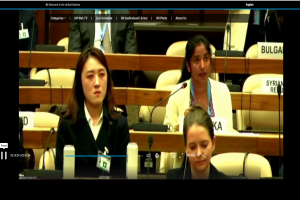
Statement by Sri Lanka on General Exchange of Views
Mr. Chair,
Sri Lanka would like to congratulate you on your assumption of the Chair of the first session of the 2022 of the OEWG on reducing space threats and for the opportunity to share our views on this subject. You have our full support in moving this process forward towards a substantive outcome. We would also like to appreciate the thought-provoking presentations made by today’s panelists.
Sri Lanka’s active engagement on the issue of Prevention of Arms Race in Outer Space (PAROS) has been well known and dates back to the early 80’s when with likeminded developing states, we called for the preservation of outer space as the common heritage of all mankind, to be used in cooperation and solely for peaceful purposes. It is in as far back as 1985 that Sri Lanka proposed a moratorium on the testing and development of space weapons preceding multilateral negotiations on a treaty to prohibit all weapons in space. As you are aware Sri Lanka continues to present the First Committee Resolution on the Prevention of an Arms Race in Outer Space (PAROS) alternatively with Egypt each year for over four decades and remains true to its principled position that outer space is the common heritage of all humanity and should be kept free of weaponization.

Statement by Sri Lanka
9 May 2022
Mr. Chair,
Since the first launching of a satellite in 1957, space exploration, interest and use of space have developed rapidly. Conflict in space could affect not only space faring nations but also those who do not have space power in view of the interconnectedness and the reliability of space based services. The Outer Space Treaty, the legal cornerstone of international law on space activities, recognizes in its preamble “the common interest of all mankind in the progress of the exploration and use of outer space for peaceful purposes” and establishes in its Article 3 the basic principle that, “activities in the exploration and use of outer space, including the moon and other celestial bodies, shall be in accordance with international law, including the Charter of the United Nations.” In addition, the Rescue Agreement of 1968, the Liability Convention of 1972, Registration Convention of 1974, the Moon Treaty of 1984 as well as UN declarations and principles which are non binding in nature provide important references to existing legal regime and principles on space behaviour.
At the Interactive Dialogue on the written update of the High Commissioner for Human Rights on Sri Lanka, which concluded on 7 March 2022, Sri Lanka received overwhelming support from countries of the Global South who expressed support for the Government’s significant efforts towards reconciliation and reiterated the importance of objective and constructive cooperation as the fundamental basis for multilateral engagement.
Of the 45 countries that spoke at the Interactive Dialogue, 31 spoke in support of Sri Lanka. Sri Lanka received cross-regional support from a broad spectrum of states of South, South East and Central Asia and the African Group. The 31 countries that spoke in favour of Sri Lanka were Saudi Arabia, Egypt, Philippines, Nepal, Kenya, Ethiopia, Maldives, China, Cuba, Japan, Syrian Arab Republic, Viet Nam, DPRK, Venezuela, Nigeria, Pakistan, Cambodia, the Russian Federation, Lebanon, Uganda, Belarus, Zimbabwe, Eritrea, South Sudan, Lao PDR, Yemen, Iran, Niger, Kazakhstan, Bangladesh and Azerbaijan.
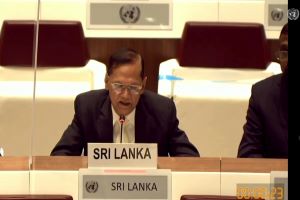
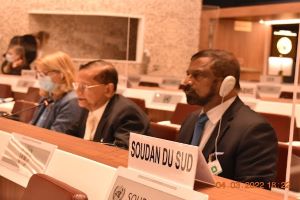
Mr. President,
The Resolution 46/1 on Sri Lanka was adopted by a divided vote in this Council. Sri Lanka and other Member States opposed this resolution in fundamental disagreement with its deeply flawed procedure and unacceptable content, in particular its OP para 6 regarding a so-called evidence-gathering mechanism. The Resolution was directly contrary to the Council’s founding principles of impartiality, objectivity and non-selectivity. It went well beyond the mandate that Member States conferred on it by UNGA Resolution 60/251. I have stated Sri Lanka’s views on this matter to this Council on 01 March. We also submitted in a timely manner our comments on the High Commissioner’s report. We note with regret that the Secretariat failed to publish this simultaneously with the High Commissioner’s written update.
Despite our rejection of the resolution, we will continue our voluntary international undertakings on human rights and engage with the United Nations, including with this Council. As stated by President Gotabaya Rajapaksa of Sri Lanka to our Parliament on 18 January 2022, “We are a nation that respects international laws and conventions”. We have regularly shared our progress and challenges in a candid and open exchange with this Council and other relevant organs of the United Nations system.
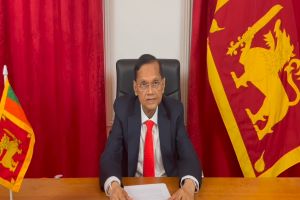
Mr. President,
Madam Secretary General and
Distinguished delegates,
It is an honour for me to address the high-level segment of the Conference on Disarmament, the world’s sole multilateral disarmament negotiating forum.
Mr. President as a member of the Conference on Disarmament since its inception, we take pride in its past achievements and recall its successes and those of its predecessor entities which led to the conclusion of landmark Conventions such as the Treaty on the Non-Proliferation of Nuclear Weapons (NPT), the Biological Weapons Convention (BWC) the Chemical Weapons Convention (CWC) and the Comprehensive Test Ban Treaty (CTBT). I would like to reiterate at the outset Sri Lanka’s long-standing policy against the possession development and use of all weapons of mass destruction; chemical, biological and nuclear. We remain a strong advocate of nuclear nonproliferation and disarmament in line also with the principles of the Non Aligned Movement in multiple fora in New York , Vienna , the Hague and in particular here at the Conference on Disarmament in Geneva.
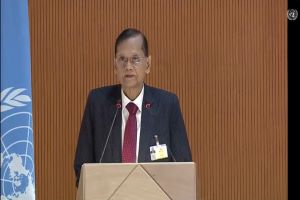
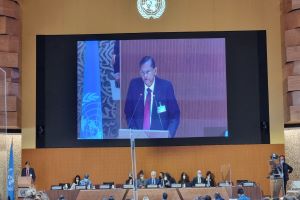
Mr. President,
Sri Lanka is an active participant in the multilateral framework to realize the promotion and protection of human rights.
Fundamental rights are embodied in our Constitution, progressively advanced through our democratically elected organs of government and enforced through our independent judiciary. Despite multiple challenges we have faced from terrorism, we have restored peace, security and the rule of law throughout the country. Our democratic traditions and independent institutions ensure free and fair elections at regular intervals through universal adult franchise. We will further advance the considerable progress we have made in post-conflict recovery and healing. For this, we have put in place domestic institutions for reconciliation, accountability and social justice.
Through this Council, we have completed 3 mutually beneficial Universal Periodic Reviews, engaged in constructive dialogue with the Treaty Bodies, welcomed Special Procedures Mandate Holders, and held frank and open discussions with domestic and international interlocutors. We have benefitted from the considerable expertise available with the UN on human rights including through its technical cooperation and capacity building programs. Through the UN country team, we value the ongoing support to our domestic processes on reconciliation and achievement of SDGs.
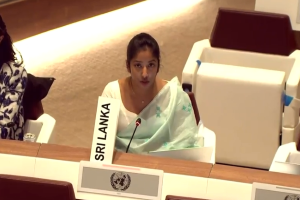
Thank you Madam Chair
allow me to congratulate you at the outset on your appointment as the chair of this Committee and to assure of our full support.
Sri Lanka takes note of the content of the draft report, and we note with concern that the recommendations on the future mandate of the GGE have fallen short of the expectations of those who voiced for a more ambitious mandate for the GGE.
- Convention on Prohibitions or Restrictions on the Use of Certain Conventional Weapons Which May be Deemed to Be Excessively Injurious or to Have Indiscriminate Effects CCW Sixth Review Conference General Exchange of Views Statement-Sri Lanka 13.12.2021
- Meeting of States Parties to the Biological Weapons Convention (BWC) 22-25 November 2021 Agenda item 5 - General Debate, statement of Sri Lanka
- Nearly 12 000 landmines destroyed by Sri Lanka under the Mine Ban Convention
